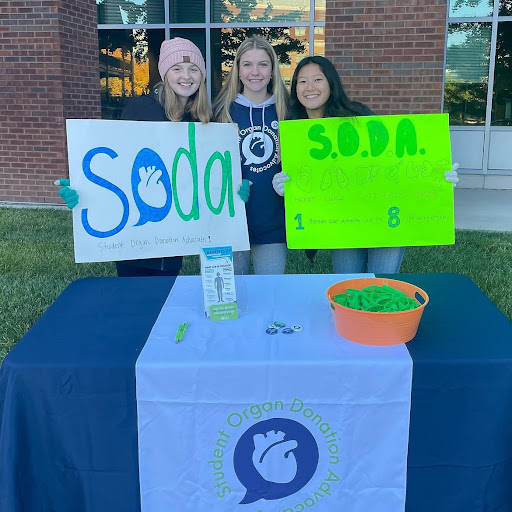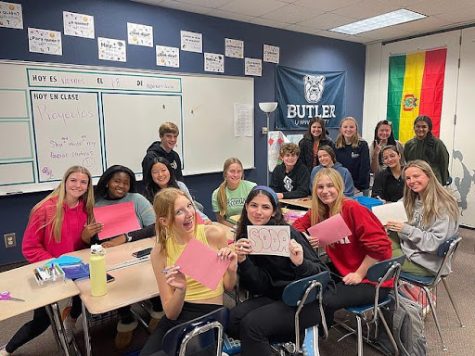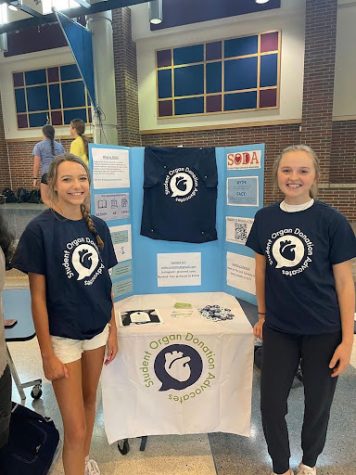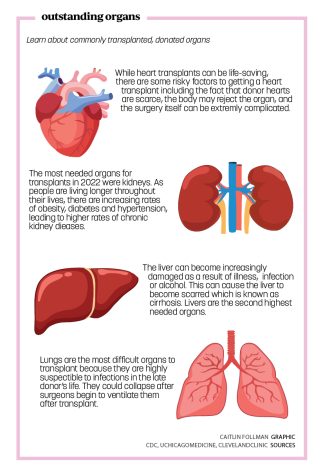
Feb. 14 marks Organ Donation Day, a day which highlights a growing national issue regarding the lack of available organs for organ transplants. Inspired by the Student Organ Donation Advocates (SODA) organization, students at this school started a SODA chapter in order to combat this issue.
Julia Dong, SODA Club vice president and senior, said she helped create the club after learning about the benefits and impacts of organ donation at health fairs and while doing medical research. She said she wanted to educate students about organ donations.
“One of the goals of SODA is to, through advocacy, help educate other students, especially younger students. We’re trying to reach out to middle schoolers to get them interested in this from a young age to have them understand the impacts,” she said.
Dong said the club hopes to inform students of the many positive impacts of registering as an organ donor that people may be unaware of.
“Organ donations go to patients to save lives, but they also help contribute to scientific efforts,” she said. “If you were really old and you died of a rare type of cancer, your organs (and) your tissue could be very valuable to scientists who are trying to discover cures for that cancer and to understand how those diseases work.”

According to Duane Brodt, Indiana Donor Network media relations and communications specialist, the issue of being unable to provide people on organ transplant waitlists with organs stems from the difficulties of matching organs as well as misconceptions surrounding the act of registering as an organ donor. He said because of this, thousands of people are unable to receive help.
“Currently in the U.S., more than 106,000 people need an organ transplant now to save their lives. Every day, 17 people die waiting for an organ they need to survive. In Indiana, more than 1,100 Hoosiers are on the waiting list for an organ transplant,” he said. “The need for lifesaving organs is high.”
Sophia Renner, SODA student engagement coordinator, said she agreed with Brodt and said becoming an organ donor would contribute to resolving the shortage of organs.
“Every 10 minutes, someone is added to the organ donation waiting list. So registering to be an organ donor essentially means that you’re going to, if, for some reason you were to donate your organs, you help eliminate people from that very long waiting list,” she said. “One organ donation, one organ donor, can save up to eight lives and enhance the lives of 75.”

Renner said SODA founder Sarah Miller began the organization because of a life-changing part of her life that reflected the importance of organ donations.
“Miller’s sister was an organ donor. She had a medical emergency when Sarah was young and passed away. Sarah and her family decided to donate her organs and they ended up saving the life of a special education teacher who was dying of liver failure,” she said. “So when Sarah got older, and she was in college, she was inspired to start the first SODA club on her campus, which was Washington University in St. Louis.”
Brodt added to Renner’s story and said, “Unfortunately, for many reasons, many people simply do not think about how their decision to become an organ donor save lives until they have a personal experience, like being a victim of trauma or facing the death of a loved one suffering from cancer or other debilitating disease that destroys one’s organs.”
Dong said while organ donations provide ill patients another chance at life and contribute to scientific research, misconceptions create a barrier between those in need of organ transplants and potential organ donors.
“There’s a lot of myths surrounding organ donation. A lot of people don’t think they can have open-casket funerals if they become an organ donor, which they still can,” she said. “A lot of people think that doctors won’t do whatever it takes to save their lives if they’re an organ donor, and all of those myths are false. There’s measures in place to make sure those things don’t happen, so it’s very secure.”
Renner said she agreed with Dong and said, “If you go to a hospital and you need treatment, and you’re also registered to be an organ donor, you will still receive the best treatment that doctors can provide you with. Being an organ donor doesn’t mean that doctors will give you less treatment because they want you to donate your organs.”
Renner said another common misconception of those reluctant to register as organ donors involves religious beliefs.
“All major religions are accepting of giving the gifts of life. It’s something that in one way or another, you can find that they do support,” she said.

Brodt said he agreed that misinformed ideas prevent people from registering as organ donors and said people should be aware that becoming a donor has no additional medical costs. He also said status and race are also never taken into consideration when becoming an organ donor.
“A federally managed, national system matches available organs from a donor with people on the transplant waiting list based on blood type, body size, how sick they are, distance of recipient, tissue type and time on the list. Race, income, gender, celebrity and social status are never considered,” he said.
Dong said she believes students are not sufficiently educated about organ donations. She said she encouraged students to educate themselves about the topic of organ donations so that they can make a choice that will allow them to save the lives of others.
“A lot of students aren’t really educated on the topic. They get one or two videos in driver’s ed about it and that’s pretty much it and then you’re kind of thrown into this important decision,” she said. “Most people just don’t really know or they’re unsure about the intentions or the efforts, or the impacts of it as a whole, so they end up making an uninformed decision.”


































![British royalty are American celebrities [opinion]](https://hilite.org/wp-content/uploads/2024/03/Screenshot-2024-03-24-1.44.57-PM.png)



















![Review: Quiet on Set: The Dark Side of Kids TV is the long awaited exposé of pedophilia within the children’s entertainment industry [MUSE]](https://hilite.org/wp-content/uploads/2024/04/unnamed.jpg)
![Review: “The Iron Claw” cannot get enough praise [MUSE]](https://hilite.org/wp-content/uploads/2024/04/unnamed.png)
![Review: “The Bear” sets an unbelievably high bar for future comedy shows [MUSE]](https://hilite.org/wp-content/uploads/2024/03/unnamed.png)
![Review: “Mysterious Lotus Casebook” is an amazing historical Chinese drama [MUSE]](https://hilite.org/wp-content/uploads/2024/03/0.webp)
![Thea Bendaly on her Instagram-run crochet shop [Biz Buzz]](https://hilite.org/wp-content/uploads/2024/03/IMG_0165-1200x838.jpg)
![Review in Print: Maripaz Villar brings a delightfully unique style to the world of WEBTOON [MUSE]](https://hilite.org/wp-content/uploads/2023/12/maripazcover-1200x960.jpg)
![Review: “The Sword of Kaigen” is a masterpiece [MUSE]](https://hilite.org/wp-content/uploads/2023/11/Screenshot-2023-11-26-201051.png)
![Review: Gateron Oil Kings, great linear switches, okay price [MUSE]](https://hilite.org/wp-content/uploads/2023/11/Screenshot-2023-11-26-200553.png)
![Review: “A Haunting in Venice” is a significant improvement from other Agatha Christie adaptations [MUSE]](https://hilite.org/wp-content/uploads/2023/11/e7ee2938a6d422669771bce6d8088521.jpg)
![Review: A Thanksgiving story from elementary school, still just as interesting [MUSE]](https://hilite.org/wp-content/uploads/2023/11/Screenshot-2023-11-26-195514-987x1200.png)
![Review: When I Fly Towards You, cute, uplifting youth drama [MUSE]](https://hilite.org/wp-content/uploads/2023/09/When-I-Fly-Towards-You-Chinese-drama.png)
![Postcards from Muse: Hawaii Travel Diary [MUSE]](https://hilite.org/wp-content/uploads/2023/09/My-project-1-1200x1200.jpg)
![Review: Ladybug & Cat Noir: The Movie, departure from original show [MUSE]](https://hilite.org/wp-content/uploads/2023/09/Ladybug__Cat_Noir_-_The_Movie_poster.jpg)
![Review in Print: Hidden Love is the cute, uplifting drama everyone needs [MUSE]](https://hilite.org/wp-content/uploads/2023/09/hiddenlovecover-e1693597208225-1030x1200.png)
![Review in Print: Heartstopper is the heartwarming queer romance we all need [MUSE]](https://hilite.org/wp-content/uploads/2023/08/museheartstoppercover-1200x654.png)























![Review: Ladybug & Cat Noir: The Movie, departure from original show [MUSE]](https://hilite.org/wp-content/uploads/2023/09/Ladybug__Cat_Noir_-_The_Movie_poster-221x300.jpg)

![Review: Next in Fashion season two survives changes, becomes a valuable pop culture artifact [MUSE]](https://hilite.org/wp-content/uploads/2023/03/Screen-Shot-2023-03-09-at-11.05.05-AM-300x214.png)
![Review: Is The Stormlight Archive worth it? [MUSE]](https://hilite.org/wp-content/uploads/2023/10/unnamed-1-184x300.png)

